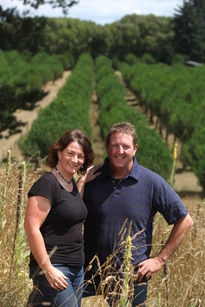Pinoli is New Zealand's only Mediterranean Stone Pine (Pinus pinea) Plantation and its just taken out the Supreme Champion Award at the 2023 Food Producer competition.
Many are questioning why Stone Pines aren't being considered as a solution to the country's significant Pinus radiata 'slash and wilding' problem. By addressing this issue, Stone Pines could offer a dual solution to the dilemma while also creating a viable economic export contribution and a reduction in carbon emissions.

Source: Pinoli

In 1998, Zoe Thompson and Lee Paterson with business partners Andy and Barb Wilshire started planting Stone Pines, which have been quietly growing into a thriving business for the last 19-years, setting up a 60-100 year life span. With over half a million trees yielding highly nutritious and protein-rich nuts, chefs refer to them as 'pure gold.' The plantation spans nearly 500 hectares bordering New Zealand's lush Marlborough wine growing region in the Wairau Valley.
Despite the magnificent Stone Pine offering both sustainability and long-term economic benefits to New Zealand, it currently does not meet the criteria to be part of the global Emissions Trading Scheme. Pinoli, General Manager Lee Paterson suggests if this were to change, New Zealand could be in a prime position to reap the rewards.
Source: Pinoli -Zoe Thompson & Lee Paterson
"Considering the management issues associated with Pinus radiata, such as 'slash and wilding,' the Pinus pinea can be equally effective in meeting the demands of the Emissions Trading Scheme. New Zealand should be more assertive in advocating for its inclusion, which could lead to an industry worth millions of dollars and accounting for up to 20 percent of global production. We have the potential to expand from our current 500-hectare 'nut orchard' to over 8,000 hectares, country-wide", says Lee Paterson
Currently global pine nut production is estimated by the International Nut & Dried Fruit Council (INC) in 2022/2023 of between 25,000 and 30,000 Metric Tonnes - a decline of around 27%. due to global climatic and natural events in the key producer countries - China, followed by Russia, Afghanistan, Pakistan, Mongolia. Exact output seem to conflict but these estimates would tend to be more accurate according to Pinoli.
"The Stone Pine has the potential to provide a dual financial benefit to growers by producing valuable pine nuts with an average retail return of NZ$120 to $150 per kilogram while also generating carbon credits for the grower", says Lee Paterson.
Source: Pinoli
In terms of value, the global market for pine nuts was valued at USD 1.54 billion in 2020 and is expected to reach USD 2.14 billion by 2028, growing each year by 4.3% from 2023 to 2028, So the multiple rewards for New Zealand farmers to convert dry high country and coastal regions to Pine Nuts are definitely quantified thanks to the patience and hard work of those stewarding the Pinoli brand onto the world stage.
"The significant interest from local farmers demonstrates their readiness to convert suitable dry hill country into nut-bearing Mediterranean Stone Pine plantations, supporting New Zealand's carbon emission targets and providing a boost to sustainability efforts. It would be a massive win-win for New Zealand", concludes Lee Paterson.
From the Editor: Looking for a fabulous Basil & Pine Nut Pesto recipe?
LINK TO OUR RECIPE PAGES HERE. Credit 'Let's Eat Raw Recipe Book by Scott Mathias available on Booktopia or Amazon

ENDS:
Refs:
FAO. (2016). FAOSTAT database. http://www.fao.org/faostat/en/#data/QC
Grand View Research. (2021). Pine nuts market size, share & trends analysis report by type (chinese pine nuts, siberian pine nuts, italian pine nuts), by application (food, pharmaceuticals, cosmetics & personal care), and segment forecasts, 2021-2028. https://www.grandviewresearch.com/industry-analysis/pine-nuts-market

























Comments